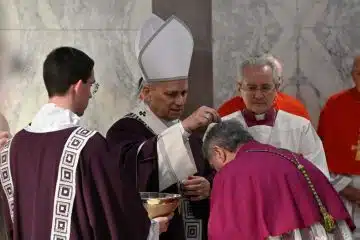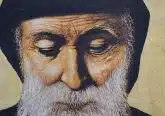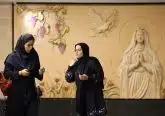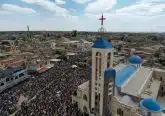Monks close doors of St. Catherine’s Monastery as battle with Egypt government continues
ACI MENA, Jun 6, 2025 / 15:30 pm
The future of St. Catherine’s Monastery in Egypt’s Sinai Peninsula remains a source of controversy, with tensions rising after a recent court ruling that transferred the site to state ownership while granting the Church only usage rights.
The decision was met with strong opposition from the monastery’s monks, who have now closed its doors to visitors in protest.
Despite reassurances from Egyptian authorities, the ruling has alarmed the Orthodox Church, which described it as a “dangerous precedent.”
The opposition has extended far beyond Egypt.
The Ecumenical Patriarchate of Constantinople along with the Orthodox Patriarchates of Jerusalem and Alexandria, the Churches of Greece and Cyprus, and the Greek Union of Theologians have all voiced apprehension. Meanwhile, other churches have chosen to remain silent — a stance that has only complicated the situation further.
Greece has emerged as the strongest political voice in defense of the monastery, issuing formal statements and engaging in high-level diplomacy to protect the sacred Orthodox site. Greece’s minister of foreign affairs, Georgios Gerapetritis, met with Egypt’s minister of foreign affairs, Badr Abdelatty, in Cairo on Wednesday where they discussed the status of St. Catherine’s.
Archbishop Damianos of Sinai, Pharan, and Raitho described the situation as “judicial manipulation.” He explained that since 1980, the monastery has submitted ownership documents for 71 sites and retained official receipts as proof. However, the state has consistently refused to recognize these claims, even as similar cases were fully acknowledged elsewhere. He expressed frustration that the monks are now being treated as if they’ve illegally seized land and are being asked to pay to use it.
He added that a previous agreement had been reached between the Church and Egyptian authorities, with Greek government representatives present. However, the deal was recently altered unilaterally.
“We have protected this treasure since the sixth century,” he said. “And now we’re told we can use it — but we don’t own it.” With sorrow, he continued: “I am 91 years old, and I have lived here since I was 27. Imagine how great the pain is!”
The monastery’s legal representative, Christos Kompiliris, explained that negotiations over the agreement lasted nine months and were nearly finalized when talks abruptly ended just before the signing. A court ruling was then issued that contradicted the core of that understanding. He warned that the ruling allows the state to reclaim the property if the monks ever leave — for any reason — placing their continued presence at the mercy of unpredictable political or administrative decisions.
“This new legal status puts the monastery’s entire future at risk,” he said.
Kompiliris also expressed concern that the ruling not only affirms state ownership but also permits the confiscation of 25 of the 71 properties belonging to the monastery.
Behind the scenes, some believe the controversy stems from the “Great Transfiguration” project, launched in 2021 by the Egyptian president to turn the St. Catherine area into a fully integrated tourist destination. Critics argue that the plan threatens the site’s sacred monastic character. Others, however, view the ruling as a matter of Egyptian sovereignty, intended to prevent the monastery from evolving into an independent entity, something akin to a “new Vatican.”
This story was first published by ACI MENA, CNA’s Arabic-language news partner, and has been translated for and adapted by CNA.













